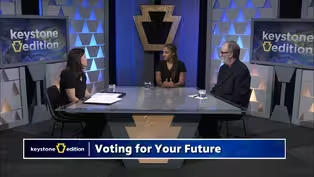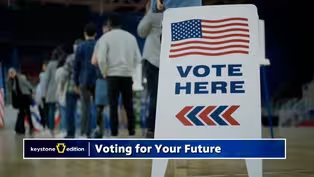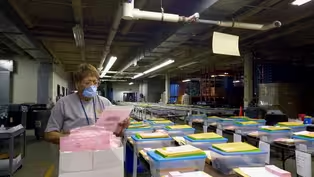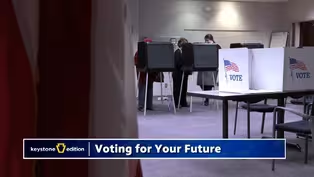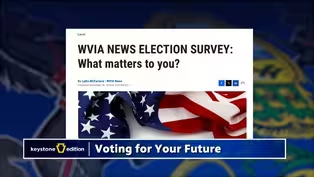Keystone Edition
Youth Vote in Pennsylvania
Clip: 10/7/2024 | 12m 33sVideo has Closed Captions
An interview with young Republicans and Democrats from local Universities.
Host Julie Sidoni interviews Brigid Carlin, President of the University of Scranton College Democrats club, and Katelin Schooley, Wilkes University student and intern on Republican Congressional candidate Rob Bresnahan's campaign.
Problems playing video? | Closed Captioning Feedback
Problems playing video? | Closed Captioning Feedback
Keystone Edition is a local public television program presented by WVIA
Keystone Edition
Youth Vote in Pennsylvania
Clip: 10/7/2024 | 12m 33sVideo has Closed Captions
Host Julie Sidoni interviews Brigid Carlin, President of the University of Scranton College Democrats club, and Katelin Schooley, Wilkes University student and intern on Republican Congressional candidate Rob Bresnahan's campaign.
Problems playing video? | Closed Captioning Feedback
How to Watch Keystone Edition
Keystone Edition is available to stream on pbs.org and the free PBS App, available on iPhone, Apple TV, Android TV, Android smartphones, Amazon Fire TV, Amazon Fire Tablet, Roku, Samsung Smart TV, and Vizio.
Providing Support for PBS.org
Learn Moreabout PBS online sponsorshipWe begin with a look at what voters in Northeastern and central Pennsylvania might be thinking.
In this half hour, we will talk with representatives from both young Democrat and Republican organizations in the area.
We're gonna try to get a sense of what role different generations might play on election night, and we'll hear from two WVIA journalists who've been covering this election about what they are seeing and hearing.
Now, we know a youth vote could play a big role in who wins Pennsylvania and the presidential election.
A "New York Times" Siena College poll released late last month showed that if the election were held today, 58% of voters aged 18 to 29 would vote for Kamala Harris, whereas 37% would vote for Donald Trump.
5% are undecided, or didn't answer.
A different poll released late last month from the Harvard Kennedy School Institute of Politics has Harris with a 31-point lead over Trump among voters 18 to 29.
Here to share their views on the election are Brigid Carlin, a senior at The University of Scranton and president of the university's College Democrats Club, and Katelin Schooley, who's a senior at Wilkes University and an intern for Republican Congressional candidate, Rob Bresnahan's, campaign.
Katelin and Brigid, I am so glad that you've joined us today.
Don't be nervous.
(all laugh) It will all be just fine.
I would really like to start actually by asking a bit of a personal question of both of you, is what got you involved in politics at such a young age?
- So I've been involved with politics as early as I can remember.
My grandfather, I'm from Rhode Island originally, so my grandfather was in the state senate when I was little.
And then my parents have always, you know, talked politics and stuff with me growing up.
So the first big election that I can remember was back in 2016, that was when I was really passionate about politics, and we had a mock election in my middle school.
So that was sort of my gateway, and now I major in it.
- It kind of opened your eyes to what was out there.
- [Brigid] Right.
- I'll ask you the same, Katelin.
- I probably started out really getting into it in middle school.
I did a project of, like, what you wanna do in the future, and I found that I wanted to go into the military.
So I went to Wilkes University for the Air Force ROTC program.
And with that, you get into politics a little bit as to like what the military's doing.
So my current role, I'm an intern on Rob Bresnahan's campaign, and I got an email from school, they were looking for interns, and I applied and just hit the ground running from there.
- We're particularly interested in what people your age have to say about the election, and what they're seeing and hearing.
And I know you're both in your early twenties, so let's talk a little bit, not just personally, but what are you seeing and hearing from your peers?
I mean, just in general, are people paying attention to the election?
Are they not caring about the election?
Are they very passionate about the election?
Where are your friends, and even the family members who might be in your age group, where are they falling in this?
- So through my internship, Luzerne County young Republicans have been really coming out to support the younger candidates.
We have two really young candidates right now, both Rob Bresnahan and McKayla Kathio.
So we're trying to bring younger, new representatives into the area.
- Is that kind of one of the things you're hoping as the Republican party?
Like, "Hey, these are young candidates.
Hey, youth voters, pay attention to this."
Is that something that you're trying to do as a campaign?
- I'd say yes.
We've had a lot of support from college students.
We have a group of college students who go out and do doors for Rob's team, and do different events well.
So I'd say yes.
A lot of young people are helping with the campaigns and trying to get people... - To get involved.
- Yeah.
(laughs) - Brigid, what about you?
Same question?
- I would say the same.
As in terms of the College Democrats Club on my own campus, most of our members are freshmen or sophomores, which means that a lot of, especially younger people within the Gen Z population, are really engaged and really paying attention.
I know my little siblings are also very engaged.
The family group chat goes off almost every day about something new.
(all laugh) - Both of you brought up going door-to-door and canvassing.
And I would love to hear your impressions, because now we're talking about not just people that you know, people on a college campus who may be more likely to wanna talk to you.
I mean, going door-to-door is difficult work.
So let's start with you again.
What are you finding when you go to talk to people?
Is it as scary out there as some people think it is?
- It's definitely not as scary out there as some people think it is.
I mean, at the core of it, I'm a human and I'm talking to a human behind a door, so it's much easier for, I mean, it's much harder for them to slam a door in my face than to hang up on the phone.
But with that being said, I would say that a lot of people that I've talked to, at least going door-to-door, have their minds made up about who they're voting for.
- [Julie] Already?
- Right.
- Is that a generational thing, or do you think that's across the board?
- It's hard to say honestly.
I think that a lot of people that I talk to on a personal basis know who they're voting for already, and part of it is either agreeing with them or trying to change their mind.
So I think that if there's an issue that you've seen represented that you're really passionate about, you already know who you're voting for.
So I think that's not a generational thing, but I think that it might be a little bit clearer to some people than others.
- In your opinion, what is the issue?
What is the issue that you're hearing most about?
- From what I've heard from doing doors a lot is about affordability for youth, for our future to buy a home, and a lot about border security.
One house that I went to while canvassing for Rob was a gentleman who moved here from Mexico, and he conveyed his, like, concerns.
He went through this whole process to become a United States citizen, and now he's seeing hundreds of thousands of people cross the border without having to go through those same channels that he did.
So he is just very frustrated with the whole sense of the situation.
- That's interesting to me because one of those topics is right here at home, you know?
Can I afford a house in a couple years when I graduate?
And the other one is happening on the other side of the country.
And I have wondered how much people, you know, around the nation react differently to immigration.
What is your one topic that you're hearing the most about?
- The one topic that I'm hearing the most about is reproductive rights and reproductive healthcare.
So a lot of women, especially Gen Z voters and younger women, are particularly concerned about the rights that they'll have in the future.
And not just women, men too.
I've talked to a couple of my male friends on campus and they have sort of the same level of concern that I do about that, because it's not, you know, just a women's issue, although it is a woman's issue.
(laughs) - Right.
So you mentioned having a debate party, a party for the vice presidential debate.
Let's talk a little bit about the VP candidates.
I mean, not necessarily the two of them themselves, but what are you hearing about the VP candidates?
Do you think that the choices are helping the presidential candidates?
Or do you see that sort of going the other way?
- Honestly, I hate to say it, I've seen a lot of support for Vance after the vice presidential debate, because he was just so polished and spoke so cleanly.
But I related to what Walz was saying more than Vance's style, if that makes sense.
- [Julie] It does.
- Although I believe that, you know, Vance is a great speaker, and he looked really good on that stage, Walz was talking about issues, and I know that he can back it up with facts that are from off the stage, not just on the stage.
- Do you have a comment there, or are you hearing anything about the VP race that is either infusing the presidential race with energy?
Or maybe that's not happening from where you stand?
- Yeah, from what I've heard, everybody's been liking Vance, especially after the debate.
They really liked what he had to say and how he conveyed his message, and that he's, like, a good running mate for Trump.
So I haven't heard anything negative from that.
- I will say too, a lot of what I've seen on social media was just general support for both of the candidates in that they were respectful, they shook hands, they talked to each other.
You know, that moment when Vance expressed his condolences for Tim's son was, you know, heard by a lot of people.
- This could be a whole other topic, (both laugh) but social media interests me because it's not something that I grew up with, and it's something that has just always been part of your lives.
One of the last things I wanna talk about is the role of social media and how you think that the internet, in general really, but how you think social media is going to affect this?
Do you have a comment on that?
- I think social media really helps, like, all of our candidates.
Our younger generation, we're all on social media, so that's like a main source for a lot of our news and just content on the campaign in general.
So I think it's really helping on both ends.
- What about you?
- I agree with Katelin.
I think that overall social media is a good thing and it's allowed us to connect with people that we wouldn't have been able to connect with, had social media not been present.
But I will say too that it can be detrimental and you have to be careful about what you're looking at, and fact-checking.
A lot of people are so quick to, you know, repost something on their story, or like or reshare or something like that.
So you just have to dig in a little deeper and say, okay, "Where is this coming from?
Can I trust that source," you know?
Stuff like that.
- Media literacy, - Right.
(laughs) - That's a big topic.
- Right.
- Alright, well thank you to both of you.
We spoke with students on the campus of Penn State Hazleton.
Some of those students will be voting for the first time in a presidential election.
Here's what they had to say about the issues that will impact their votes.
- Well, I'm always a bit more glued into what the economic policies of the candidates will be and how it will have impacts on my local community.
- Some values I carry that will influence my vote are abortion laws and a woman's right to access, be able to have an abortion due to health complications, or for whatever reason, she may feel the need to.
- The main topic that, like, I try to focus on is the economy.
Because, at least my family, started out a little bit like lower class, and we had to heavily work our way up.
And now with my father owning his own business, it is just a very big point of concern for me.
- I have a lot more questions for Katelin and Brigid, but unfortunately, that is all the time we have for the two of you.
Any last messages that you would like to get out to people, to your peers who might be watching this?
- Definitely do some research on all your candidate options.
Find out which candidate suits your views and what you wanna see the best.
And don't just go off of the first post you see on social media.
Make sure you're doing the background research to support your decisions.
- I would say that the most important thing I could tell someone would be to go out and vote.
No matter who you support, no matter what you believe, just go out, make your voice heard.
Because the margin by which college students and Gen Z first-time voters exist in Pennsylvania could be the margin in which we win the election or lose the election.
So just go out and make your voice heard and vote.
- Alright, thank you to the two of you.
You talked about research here, to find out more about the candidates and their positions in the general election, "WVIA News" put together a 2024 voters guide.
This is a culmination of research done using a survey to gauge the most important issues for voters in our region.
To find it, go to wvia.org and click on Election 2024 in the News section.
"WVIA News's," Lydia McFarlane,
Video has Closed Captions
Clip: 10/7/2024 | 8m 14s | Borys Krawczeniuk and Lydia McFarlane from WVIA News discuss the upcoming election. (8m 14s)
Video has Closed Captions
Clip: 10/7/2024 | 1m 57s | Attention is on key races in Pennsylvania that could shape the future of Congress & state leadership (1m 57s)
Voting for Your Future - Election 2024: Preview
Preview: 10/7/2024 | 30s | Watch Monday, October 7th at 7pm on WVIA TV (30s)
Voting for Your Future - Overview
Video has Closed Captions
Clip: 10/7/2024 | 50s | In the fifth season premiere of Keystone Edition Reports, we discuss the upcoming general election (50s)
Video has Closed Captions
Clip: 10/7/2024 | 1m 42s | WVIA News surveyed prospective voters in NE & central PA to find out what issues are import to them. (1m 42s)
Providing Support for PBS.org
Learn Moreabout PBS online sponsorship
- News and Public Affairs

Top journalists deliver compelling original analysis of the hour's headlines.

- News and Public Affairs

FRONTLINE is investigative journalism that questions, explains and changes our world.












Support for PBS provided by:
Keystone Edition is a local public television program presented by WVIA
